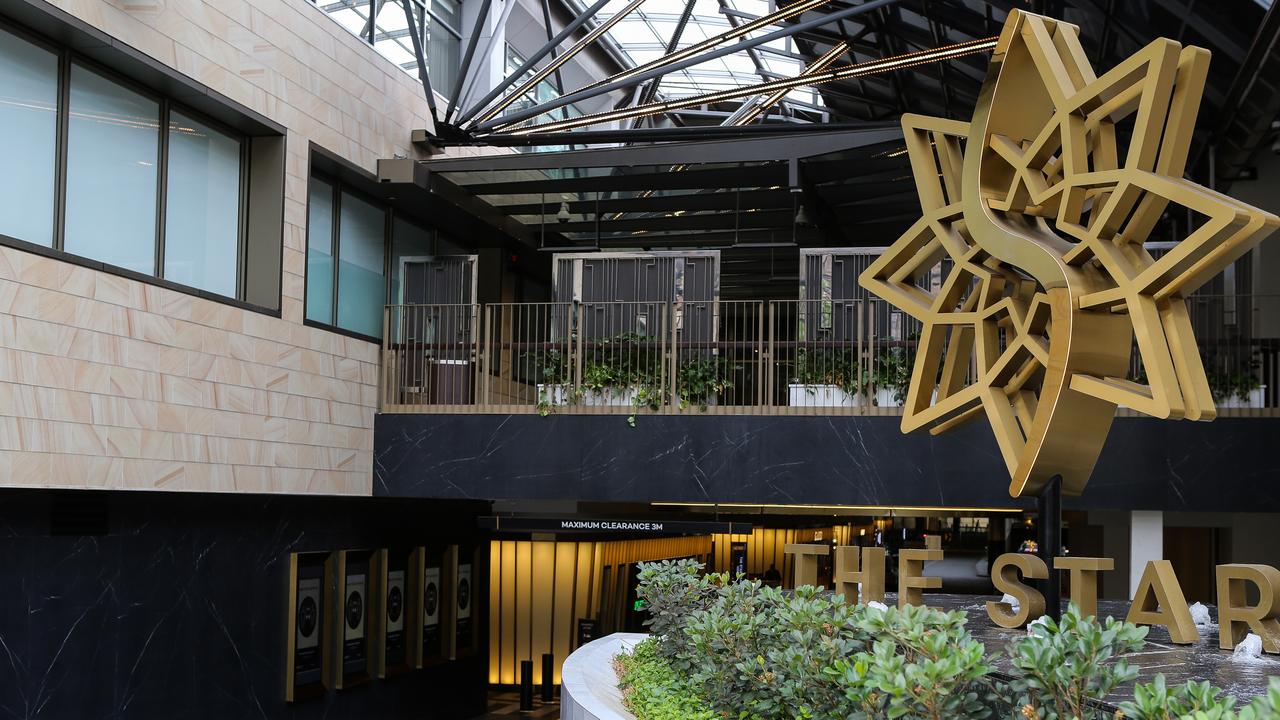Star Entertainment Group shuts down all pokie machines after update sparks disruption
A pokie machine shutdown has wiped out $40m in value from one of Australia’s major casino companies.

A pokie machine shutdown on Monday morning has wiped off millions in the value of embattled gaming company Star Entertainment.
The Star announced its pokie machines had been turned off after an issue with a systems upgrade done in preparation for cashless gaming.
In an announcement to the ASX on Monday at 8.35am, The Star Entertainment Group said post-upgrade testing had uncovered system performance issues.
As a result, all electronic gaming machines and electronic table games across the group’s three venues in Sydney, Brisbane and the Gold Coast had been turned off as of 10pm on Saturday.
“The decision was taken by The Star to ensure compliance with relevant regulations and to maintain the company’s commitment to safer gambling procedures,” the statement read.
“The Star is working closely with its external provider Konami to address the operational issues as soon as possible and will provide an update once operations return to normal.
“Treasury Brisbane, The Star Gold Coast and The Star Sydney remain open with table games, restaurants, bars and entertainment available.”

There is no timeline as to when the machines will be turned back on.
The shutdown will hit revenues, and shares in the company slumped more than 2.5 per cent at the opening bell to trade at 50c by midday, wiping off about $40m from The Star’s $1.45bn market capitalisation.
Major reforms were passed in Queensland parliament earlier this year, off the back of a 2022 review into the troubled gaming group that found “major failings” in its Queensland operations.
Under the new regulations, players must obtain a gambling card after having their identity and age verified and swipe or tap the card before they can gamble at all, even if they are using cash to do so.
In NSW, The Star was mandated to make all gaming machines cashless by August 30.
Monday’s shutdown is more bad news for a company that has confronted years of corporate watchdog investigations and penalties for serious failures at its operations.
In October 2022, the NSW Independent Casino Commission imposed a $100m fine on Star after finding the company had allowed money laundering to take place at its Sydney casino.
“Not only were huge amounts of money disguised by the casino as hotel expenses, but vast sums of cash evaded anti-money laundering protocols in numerous situations, most alarmingly through Salon 95 – the secret room with a second cash cage,” NICC chief commissioner Philip Crawford said at the time.

A report into the business also found the company had exploited vulnerable gamblers.
“The Star offered free alcohol to VIPs as an inducement to gamble and allowed vulnerable patrons to gamble continuously for more than 24 hours at a time, without intervention,” Mr Crawford said.
“These personal accounts are jarring and illustrate how unrestrained gambling can go from entertainment to exploitation.”
The NICC is conducting a second inquiry into The Star’s suitability to hold a casino licence and whether the gaming group is implementing reforms to its governance culture.
Alongside a tangled swirl of legal issues, the company is also confronting a downturn in revenues as an exodus of high rollers and cost-of-living pressures hit the business.
In a trading update from June 24, the company forecast a fall in revenues to between $1.65bn and $1.68bn.
“Current trading conditions reflect the challenging economic environment and cost-of-living pressures,” the company said at the time.
“Group revenue for Q4 FY24 is expected to be 4.3 per cent below the previous quarter (Q3 FY24) and 3.3 per cent below the prior corresponding period (Q4 FY23).”

In late June, the company appointed Steve McCann as its new chief executive, with the former Crown Resorts boss pledging to help The Star address its “many complex issues and challenges”.
Some 8000 staff operate The Star’s casinos.
In February, The Star signed a “jobs guarantee agreement” with the NSW government that legally binds the operator to maintain more than 3000 jobs in the state through to 2030.
If staff headcount is less than the required number, the company will be required to pay the NSW government $25,000 for each headcount shortfall in a quarter.
“Hardworking people should not have to pay the price for mismanagement at The Star,” Treasurer Daniel Mookhey said.
“This agreement not only protects thousands of direct jobs at The Star, it also supports thousands of indirect jobs and the many businesses that provide goods and services to the casino.”



